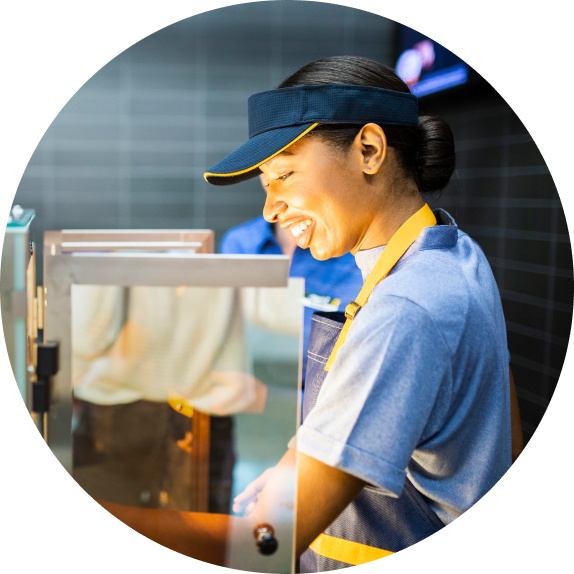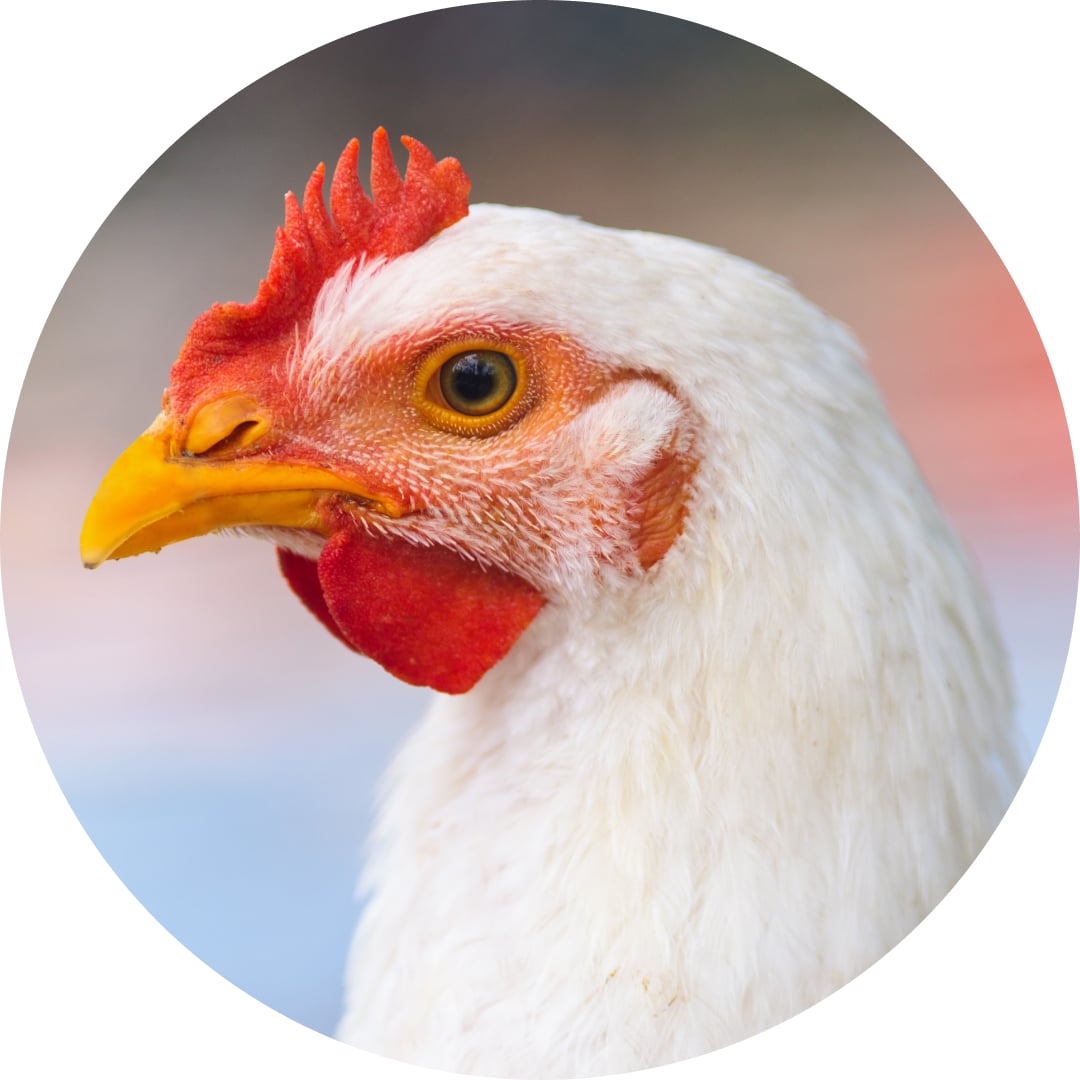Food Quality & Sourcing
We’re working toward creating a secure, more sustainable future for food by advancing safety and quality, helping to improve animal health and welfare in our supply chain and making balanced, quality meals more accessible to families across the world.
Our Impact Areas
We embed strict food safety standards and protocols in the Company’s processes, from food sourcing to menu development, packaging and distribution and the running of McDonald’s restaurants.
McDonald’s mission is to create delicious, feel-good moments for everyone. We listen to our customers and evaluate our menu to identify ways to evolve our offerings while maintaining the great taste people know and love.
The road to serving McDonald’s menu items that delight customers is long and complex. Our global supply chain spans countries, continents and industries. We approach responsible sourcing holistically, understanding that our work can impact the livelihoods of people, the health of our shared planet and the well-being of animals. We believe we must respect them all.
We believe that serving safe, quality food requires sourcing animals that are properly cared for throughout their lives. This is why the Company prioritizes animal health and welfare and responsible antibiotic use.
Recent Highlights
Food Safety
- During 2024, 98% of restaurants deployed the Digital Food Safety (DFS) checklist management system, and 40% deployed the DFS remote temperature system.
- A new learning platform was launched on the Digital Depot, providing Global Food Safety team members with short videos summarizing food safety mandatory requirements.
- Food Safety Week was redesigned based on 2023 feedback, refining content and reducing topics for a more impactful message.
Nutrition & Marketing Practices
Across our 20 major markets:1
- In 2024, an average of 64% of Happy Meal® Bundle Offerings met our Global Happy Meal Nutrition Criteria for balanced meals.2, 3 These criteria mean meals must have less than or equal to 600 calories, 10% of calories from saturated fat, 650 mg of sodium and 10% of calories from added sugar.
- We are proud to have removed 100% of artificial flavors, added colors from artificial sources and – where feasible4 – artificial preservatives from our Happy Meal offerings in 2022.
- 100% of Happy Meal nutrition information was available on all participating market websites and mobile apps as of Q2 2025.
- In 2024, 100% of Happy Meal Bundles shown in advertisements on third-party media met our Global Nutrition Criteria.
- In 2024, we featured water, milk or juice as the Happy Meal beverage, and fruit, vegetable or dairy items as one of the Happy Meal sides in 100% of the ads the Company directed to children.
Responsible Sourcing
In 2024, we continued advancing efforts to responsibly source our priority commodities, achieving the following:
- 77% of beef sourced from high-priority origins in Brazil, Argentina, Paraguay and Australia, per the McDonald’s Deforestation-Free Beef Procurement Policy, was verified to be deforestation-free through geo-monitoring. High-priority origins represented 10% of our global beef volumes in 2024. Details can be found in our Policy.5
- 100% of soy (for chicken feed) supports the transformation of soy-producing regions through investment in landscape-level solutions and initiatives covering estimated soy volumes in feed for chicken produced outside of the U.S. and Canada.6
- 96.6% of our ground and whole bean coffee was sustainably sourced.7
- 98.99% of our primary fiber-based guest packaging globally was sourced from recycled or certified sources.8
- 100% of the palm oil used in McDonald’s restaurants and as an ingredient in McDonald’s products supported the production of sustainable palm oil.9
- 95.96% of the fish sourced for McDonald’s Filet-O-Fish® sandwich was from sustainably managed wild-caught fisheries and is assessed and verified annually against the McDonald’s Sustainability Fisheries Standard by the Sustainable Fisheries Partnership.10
Animal Health & Welfare & Responsible Antibiotic Use
- We achieved our eight Broiler Welfare Commitments across our in-scope markets.
- We achieved our goal of phasing out the use of gestation stalls (small, enclosed pens) for housing confirmed pregnant sows in McDonald’s U.S. Pork supply.
Related News
- 10 Things You Probably Didn’t Know About McDonald’s Chicken McNuggets®
- McDonald’s Achieves Goal of Sourcing 100% Cage-Free Eggs in the U.S.
Reporting Across Our Purpose & Impact
For a comprehensive view of our progress and actions in 2024, please see our Goal Performance & Reporting page.
This section of our website – Our Purpose & Impact – acts as the primary platform for our foundational approach, strategies and policies over each of our priority environmental and social issues, alongside recent progress highlights. In addition to our overall approach to issues, our goals and performance work in tandem to advance transformation across our four Impact Areas, helping us drive meaningful impact.
Related Impact Areas
Additional Impact Areas across our four pillars include:
Footnotes
1 Our major markets include Argentina, Australia, Austria, Brazil, Canada, China, France, Germany, Hong Kong, Italy, Japan, Mexico, the Netherlands, Poland, Spain, Sweden, Switzerland, Taiwan, the U.K. and the U.S.
2 Averaged across the 20 major markets.
3 One market was granted an exemption from this goal due to use of a frying oil that meets local dietary customs. One market was granted an extension until the end of 2025 due to delays in technology to update their ordering channels (kiosk and mobile app).
4 McDonald’s works to ensure all items meet strict food safety and quality standards. “Where feasible” means that by removing an artificial preservative, there will not be a sacrifice in the food quality or safety standards, value or taste. In certain cases, it was determined that an artificial preservative was necessary to ensure the safety, quality, taste or value of the food.
5 Beef. We continue to refine our calculation methodology, which may create potential inconsistencies with previously reported information. Scope: Includes volume from raw material suppliers (if in priority origins according to the McDonald’s Deforestation Free Beef Procurement Policy) to beef suppliers to the McDonald’s System and all McDonald’s restaurants owned and operated by the Company and its Franchisees that sell beef. In 2024, the McDonald’s System sourced 90% of its beef from low-priority origins under the McDonald’s Deforestation-Free Beef Procurement Policy. McDonald’s requires all beef raw material sourced from high-priority origins to adhere to McDonald’s Deforestation-Free Beef Procurement Policy and meet the requirements as outlined in McDonald’s Commitment on Forests and Natural Ecosystems. Countries with origins currently identified as high priority for beef include Brazil, Paraguay, Argentina and Australia. Exclusions: Grain-fed Australian beef and beef used as secondary ingredients in McDonald’s products, for example, as flavoring in a sauce.
6 Soy (for chicken feed). Scope: Includes all estimated soy volume used in the feed of chicken sourced for McDonald’s products by all chicken suppliers to the McDonald’s System and all McDonald’s restaurants owned and operated by the Company and its Franchisees that sell chicken. Landscape-level solutions and initiatives are efforts within and with communities facing potential natural ecosystem conversion risk (including deforestation) and/or human rights-related risk in a defined geographic area to address environmental, social and economic challenges and support more sustainable livelihood. Initiatives are multi-stakeholder and include operationalization of a landscape-focused approach by setting common goals, taking collective action, reconciling different interests and monitoring progress toward desired resiliency-focused outcomes. Europe refers to Austria, Azerbaijan, Belgium, Bulgaria, Croatia, the Czech Republic, Denmark, Estonia, Finland, France, Georgia, Germany, Greece, Hungary, Ireland, Italy, Latvia, Lithuania, Luxembourg, Malta, Moldova, the Netherlands, Norway, Poland, Portugal, Romania, Serbia, Slovakia, Slovenia, Spain, Sweden, Switzerland, the U.K. and Ukraine. Exclusions: Soy used as an ingredient in McDonald’s products sold in restaurants – for example, soy oil and chicken fed on soy from the United States and Canada. The United States and Canadian markets are exploring alternative regional approaches.
7 Coffee. Scope: Includes all ground and whole bean coffee, including decaffeinated coffee, used in espresso-based drinks and coffee brewed at McDonald’s restaurants, and all ground and whole bean coffee in McDonald’s branded retail products. Includes all suppliers of coffee to the McDonald’s System. Market scope includes all McDonald’s restaurants owned and operated by the Company and its Franchisees that sell coffee, and retail outlets selling McDonald’s-branded coffee products. Countries with regions currently identified as high-deforestation priority regions for coffee include Honduras, Indonesia and Vietnam. McDonald’s requires all coffee sourced from these regions to be Rainforest Alliance Certified™. Exclusions: Coffee extracts and ingredients used in products such as frappés and coffee in baked goods; coffee in cold brew drinks if they are brewed off-site; coffee extract in ready-to-drink retail products; and other locally sourced products containing coffee.
8 Fiber. Scope: Primary fiber-based packaging refers to products that are used to package guest food on premises at McDonald’s restaurants. This type of packaging includes containers, cups, wraps, bags for food, beverages, napkins, folding cartons, clamshells, food service bags, napkins, salad bowls, Happy Meal cartons, drink carriers and cup carriers. Includes all suppliers of primary-based packaging to the McDonald’s System and all McDonald’s restaurants owned and operated by the Company and its Franchisees. In 2021, the primary fiber-based packaging scope was expanded to include plastic alternatives such as wood stirrers and cutlery, and paper straws and lids. This broadened scope has resulted in a slight decrease in percent compliance. All volumes of contingency items sourced from suppliers compliant with our standards but not integrated into our data reporting system were counted as non-compliant. Countries with regions currently identified as high-deforestation priority regions for fiber include Argentina, Cambodia, China, Indonesia, Laos, Malaysia, Russia and Vietnam. McDonald’s requires all wood fiber sourced from these regions to be Forest Stewardship Council® (FSC®) certified or FSC® controlled wood sources with full chain of custody certification. Exclusions: Primary fiber-based packaging in food packaged off-site McDonald’s restaurants; tray liners, straws and limited locally sourced items.
9 Palm oil. Scope: Includes all palm oil (including crude palm oil, palm kernel oil, derivatives and fractions) sourced for McDonald’s restaurants for use as restaurant cooking oil and all palm oil sourced by McDonald’s suppliers and used directly as an ingredient in a McDonald’s product and listed on the product’s ingredient statement. Includes all suppliers of products containing palm oil in the McDonald’s System and all McDonald’s restaurants owned and operated by the Company and its Franchisees that use palm oil. All countries are currently identified as high-deforestation priority regions for palm oil and all volumes are required to be covered by Roundtable on Sustainable Palm Oil (RSPO) certification or credits. All RSPO supply chain models applicable to RSPO are applicable to McDonald’s ‒ RSPO Identity Preserved (IP), RSPO Segregated (SG), RSPO Mass Balance (MB) and Book and Claim (BC) ‒ although McDonald’s is committed to increasing traceability by specifying physical certification for the palm oil used in the McDonald’s System in the greatest volumes (IP, SG or MB). Exclusions: Palm oil, palm kernel oil or their derivative used as secondary ingredients in McDonald’s products. This is when palm oil is used as an ingredient within an ingredient, for example, an emulsifier.
10 Fish: Fish refers to any type of fish species used as an ingredient in a McDonald’s product and listed on the product’s ingredient statement. Wild-Caught Fish refers to fish that come from seas, rivers and other natural bodies of water. Filet-O-Fish sandwich refers to the McDonald’s menu item containing wild-caught fish. Verified sustainable sources refers to wild-caught fish, sourced by suppliers to the McDonald’s System, from fisheries that are annually verified as compliant with the McDonald’s Sustainable Fisheries Standard by the Sustainable Fisheries Partnership. Marine Stewardship Council (MSC) Certification is optional to McDonald’s markets. Fisheries may also be independently certified as meeting the MSC Principles and Criteria for Sustainable Fishing where a certificate of conformity to an MSC Standard has been granted. Source: www.msc.org. McDonald’s may display the MSC certification logo in some of its markets where fisheries and restaurants are certified against the MSC Chain of Custody traceability standard. Scope: Includes all wild-caught fish sourced for Filet-O-Fish sandwich portions served in McDonald’s restaurants. Filet-O-Fish sandwich portions represents over 97% of the total fish volumes used in the McDonald’s System (by weight). Includes all suppliers of wild-caught fish for Filet-O-Fish sandwich to the McDonald’s System and all McDonald’s restaurants owned and operated by the Company and its Franchisees that sell fish. Exclusions: Products that are not Filet-O-Fish sandwich containing wild-caught or farmed fish. We estimate that these products represent less than 3% of the total fish sourced by McDonald’s by weight and may include products such as tuna, prawns, shrimp, salmon and calamari; other breaded products; and locally sourced products. The Company has set an expectation that these products are sustainably sourced, although they are not included in this global performance measure given the local, and often promotional, nature of these items. Moving forward, we have plans in place to reduce sourcing from non-compliant fisheries and will increase our supply of fish sourced from compliant fisheries as new facility options become available.
Latest Stories









